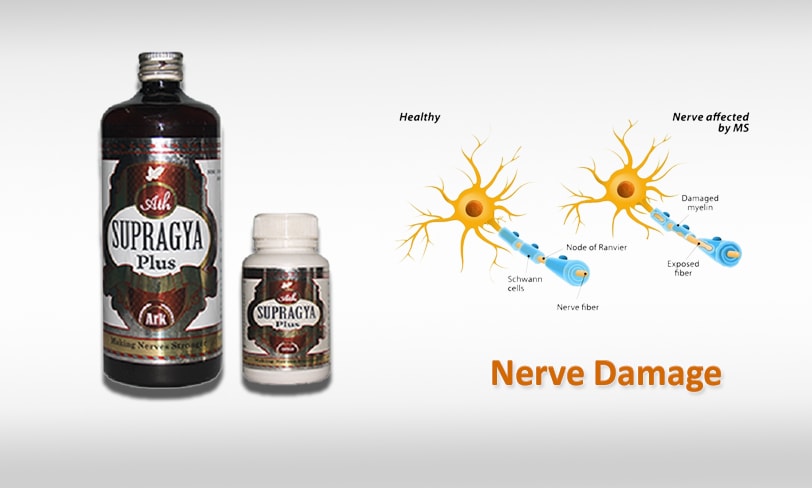Therapy for Nerve Damage
Efficacious Traditional Therapy for Nerve Damage

Ayurvedic Concept of Nerve Disorders
Nerve weakness or palsy refers to anything from weakness to complete paralysis and commonly, manifests following any kind of nerve damage. Occasionally, it is transient and fades with time. However, when it is not resolved spontaneously with medication or time, it presents as a concerning health issue, required to be handled carefully.
Nerve problems or neuropathies are considered to be Vata diseases in the Indian traditional school of medicine. Vata is regarded as one of three constitutional groupings known as doshas, is associated with the energy of the wind and, is primarily responsible for activation of the nervous system.
Vata is located in the lumbosacral (Kati) region and exerts its influence over cell division, cardiac function, and waste disposal. Vata is revered as ‘prana’, the most powerful dosha. In Ayurveda, people associated with Vata dosha are more prone to neurogenic conditions such as neuropathy, rheumatoid arthritis, heart disorders, insomnia, and anxiety.
Contraction of joints around the damaged nerve may complicate motor damage, while a loss of sensation may result in accidental or related injuries. Necrosis occurring in and around the degenerated nerve may lead to a neuroma, paresthesia, altered sensitivity to heat or cold, paresis and even, paralysis.
Causative Factors Promoting Nerve Weakness
Causes of Piles
- Autoimmune diseases including multiple sclerosis, Guillain-Barre` syndrome (in which, the peripheral nerves are attacked by immune-mediated antibodies), myasthenia gravis, systemic lupus and Inflammatory bowel syndrome.
- Neoplasms
- Nerve compression or traumatism
- Presence of internal toxins
- Side effects of drugs
- Motor neuron diseases
- Diabetes and diabetic neuropathy
- Nutritional deficiencies
- Infections such as Lyme disease, herpes infections, HIV and hepatitis C.
Commonly Presenting Symptoms of Nerve Disorders
The three forms of nerves in our body are:
- Autonomic nerves regulate involuntary or partially voluntary body functions, including temperature regulation, digestion, heart rate and blood pressure.
- Motor nerves which control movements, transmitting information to muscles from the central nervous system which comprises of the brain and spinal cord.
- Sensory nerves which provide sensory data input from skin and muscles to the central nervous system. The data is processed to enable us to feel pain and other sensations.
Any Damage To Autonomic Nerves Might Exhibit These Symptoms:
- The absence of chest pain in angina or during the incidence of a heart attack.
- Increased or decreased sweating
- Feeling of lightness of head
- Dryness of eyes and oral cavity
- Irregular bowel movements.
- Abnormal bladder function.
- Erectile dysfunction.
Motor Nerve Weakness Might Lead To:
- Weakness
- Atrophy of muscles.
- Twitches
- Inability to move
Damage To Sensory Nerves Elicits:
- Excruciating or radiating pain
- Feeling of prickling
- Increased sensation to specific stimuli such as heat or cold
- Loss of sensation
Ayurvedic Modalitiesof Treatment in Nerve Damage
Ayurvedicmedicine for nerve strength primarily comprises of formulations of Vata Harana herbs which improve blood circulation and nerve function.
- Ashwagandha (Indian ginseng): It incorporates Ashwagandha (Withania somnifera) herb root extract which contains therapeutic components, withanolides and withaferin A. It is one of the most effective herbs that balance Vata and may be used as a health tonic for weakness, enriching physical and psychological endurance through depression of the stress hormone, cortisol.
Ashwagandha has antibiotic attributes and also functions miraculously in the correction of erectile dysfunction, premature ejaculation, depressed sperm count and motility. It is instrumental in therapy for chronic fatigue syndrome, weakness, stress, palpitation, restlessness, anxiety, diabetic neuropathy and sudden weight loss. - Brahmi: The protein molecule named bacoside B present in Brahmi fortifies the central nervous system and nourishes the brain to produce a stimulating effect on cognitive ability. It has antioxidant properties which prevent neural oxidative stress and stimulates synthesis of intrinsic chemicals that antagonize neural damage.
It also equalizes dopamine levels and shields the cerebral components actively involved in serotonin uptake through the action of bacoside A, thus, balancing neurotransmission. - Shankhpushpi: It curbs neurotoxicity and relieves stress. Alkaloids present in Shankhpushpi elevate serotonin synthesis and perform the role of a brain tonic in Ayurveda, enhancing memory and promoting intelligence. It is also used for checking a wide variety of neurodegenerative disorders, cerebral hypertension, over anxiety, stress, seizures, and insomnia.
Hence, Ayurveda, in conjunction with a healthy lifestyle, ingestion of nutritious food and adequate amount of exercise may be employed effectively to improve health and preserve the vitality of nerves in our body. It aims to address the underlying root cause of nervous disorders, rather than merely focussing on symptomatic relief.
